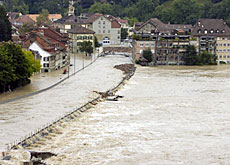
Flooding remains critical in Switzerland

The skies have begun to clear over Switzerland, but the death toll from flooding could rise to four after two people are feared drowned.
Floodwaters continued to rise on Tuesday in parts of the country where rain is only now starting to ease off.
The body of a man was found on Tuesday morning in a swollen stream near the village of Dürnten in canton Zurich.
A woman has been reported missing after she slipped and fell in the River Landquart in canton Graubünden. She was walking on the riverbank when she was struck by a tree trunk.
Two firefighters were killed by a mudslide on Sunday night in the Entlebuch region near Lucerne when they tried to help evacuate a farm.
Cantons Schwyz and Obwalden have been fighting rising waters and the resort of Interlaken was partially flooded.
In canton Schwyz, flooding caused by the River Muota forced the evacuation of 400 people in the village of Ibach.
In canton Obwalden, another 200 people were forced to leave their homes in Engelberg while the roads leading to the resort have been cut. The River Melchaa has burst its banks and is threatening the town of Sarnen.
All the schools in canton Obwalden were expected to remain closed on Tuesday.
The A2 motorway – the main north-south road through the Swiss Alps – has been closed because of damage to a bridge in canton Uri. The Gotthard railway line, which passes through the same area, was closed on Monday and is not expected to re-open for a few days.
In canton Lucerne, which was hit hardest by the rain over the weekend, water levels have begun to drop in some areas. Many roads have been re-opened to traffic, but the city of Lucerne is still struggling with flooding.
The area around the station has been closed after the River Reuss and the lake overflowed.
Critical
The situation has become “particularly precarious” in the Bernese Oberland, particularly in the region around lakes Thun and Brienz, according to local authorities. Both lakes have risen above critical levels, more damage is expected, and water levels could climb above the 1999 record.
The River Lütschine broke its banks near Wilderswil, flooding the surrounding area. Many roads and railway lines have been cut, especially near Grindelwald, which has been isolated.
At Interlaken, 150 people – many of them tourists – spent the night in civil protection shelters. Schools in the region have been closed.
The authorities fear that the River Aare could cause even more damage around Interlaken. Further downstream, cellars in Thun were flooded and power was cut in some places.
In the capital Bern, water levels remained high after rising waters covered the Matte neighbourhood on Monday.
Lake Biel in western Switzerland, into which the Aare pours, has also reached critical levels. Residents in some villages around the lake were asked to leave their houses, while one camping ground in Erlach was evacuated.
Government aid
President Samuel Schmid, who is also defence minister, visited the disaster region around Lake Lucerne on Monday. He pledged government aid for the worst affected areas.
Several hundred soldiers have already been deployed to support the civilian authorities, according to army officials.
The damage caused by the bad weather is estimated to be worth more than SFr100 million ($79 million). It is the worst flooding in Switzerland for several years.
swissinfo with agencies
Torrential rain over the past three days has resulted in the evacuation of thousands of people and the death of up to four.
Two firefighters were killed by a mudslide and two civilians died.
Flooding and mudslides are estimated to have caused damage worth more than SFr100 million ($79 million).
Since the 1970s, natural catastrophes have claimed the lives of nearly 100 people in Switzerland.
The damage caused by avalanches, flooding and landslides is estimated to have cost more than SFr9 billion over the past three decades.

In compliance with the JTI standards
More: SWI swissinfo.ch certified by the Journalism Trust Initiative




























You can find an overview of ongoing debates with our journalists here . Please join us!
If you want to start a conversation about a topic raised in this article or want to report factual errors, email us at english@swissinfo.ch.